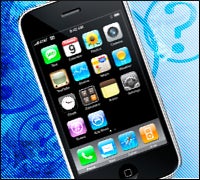 |
Is Apple ramping up testing of a new iPhone?
While the typically secretive company hasn’t given any details of its next iPhone, a report in the MacRumors Web site gives some indication of what might be ahead as competitors scramble to match and exceed features of the hot-selling device.
The report is based on information MacRumors obtained from iPhone developer Pandav, which said it spotted usage records for an unreleased iPhone in the application analytics records it tracks.
The application used was for iBART, a public transportation guide to the San Francisco train system.
Apple did not return a call for comment. The company has a long-standing policy of not commenting on unannounced products.
What apparently caught Pandav’s attention is that data delivered to it from PinchMedia, a mobile analytics firm, gives a list of devices using internal device identification numbers assigned by Apple. In this case, Pandav’s usage logs for November showed stats for an “iPhone3,1” device — an identifier that doesn’t match up with any shipping iPhones. The most recent iPhone 3GS carries the identification string “iPhone2,1”.
MacRumors notes that Apple also began testing the iPhone 3GS back in October 2008, about 8 months ahead of its launch. At the time, usage was also focused in the San Francisco Bay Area where Apple is based — Cupertino, Calif. to be exact.
iPhone up-and-comers
Analyst Jack Gold said he’s not surprised to hear Apple may testing a new device, but would be shocked if one was released this year because it’s already too late to catch holiday shoppers.
“The next big step is CES, but even there I’m not sure Apple is ready to move that quickly,” Gold, head of J. Gold Associates, told InternetNews.com. CES is the annual giant Consumer Electronics Show set to take place in January in Las Vegas.
But even if a CES debut isn’t in the offing, Gold thinks Apple may step up its delivery plans in response to a flood of Google Android devices set to hit next year.
“Apple marches to its own tune — they dictate the war, not react to it. But they also know this is a very fast-moving market and they can’t afford to sit still for too long,” he said. “I think you’ll see them pick up the pace, but it’s a balancing act. Apple can’t afford to obsolete the iPhone every six months. ”
“Apple’s been on more of a PC, annual release cadence, but with everything so hot and heavy in the smartphone market, I think that’s too long.”
Also, a new iPhone won’t necessarily cannibalize sales of its current model.
“I think there will be a lower-end iPhone from Apple in the not-too-distant future,” said Gold. “It doesn’t make sense for them to have only device.”


